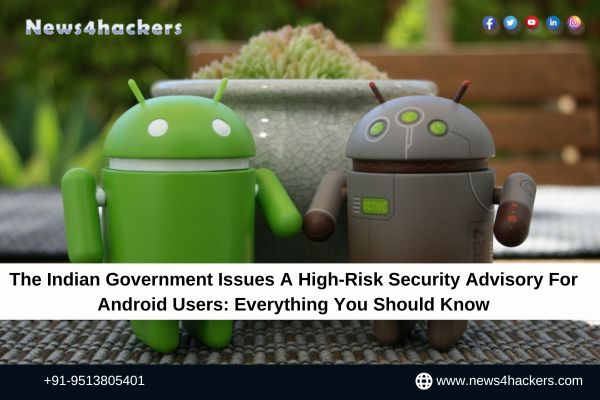The Indian Government Issues A High-Risk Security Advisory For Android Users: Everything You Should Know

The Indian Government Issues A High-Risk Security Advisory For Android Users: Everything You Should Know
Android users from various ranges have received a security alert from a government agency. The alert describes the issue, and its impact on users, and provides guidance on appropriate actions.

The Indian government’s nodal security agency has issued a new security alert to Android users in India that affects millions of Android phones. The notification is issued by CERT-In, the Indian Computer Emergency Response Team, informing them of a critical vulnerability in the most recent smartphones that could facilitate the theft of data by hackers.

In its most recent April 2024 bulletin, CERT-In stated, “These vulnerabilities are present in Android due to defects in the framework, system, Google Play system updates, Arm components, Imagination Techniques, MediaTek elements, Unisoc parts, Qualcomm elements, and its closed-source sections.”
Android versions are now susceptible to a new security risk.
Additionally, the note specifies which versions of Android are susceptible to the security risk:

- Android 12
- Android 12L
- Android 13
- Android 14

Over 90% of active Android devices in the country are operating on these versions; what is more concerning is that the components are sourced from key technology manufacturers, which provide the hardware required to power these phones.

A number of Android vulnerabilities have been documented, each of which could be utilized by a malicious actor to acquire elevated privileges, execute denial-of-service attacks, or obtain sensitive information.

Due to such security vulnerabilities, Android users are susceptible to phishing attempts that circumvent their protections and enable malicious actors to take data. Verifying that the Android version on your device has the most recent security upgrade and refraining from installing applications or clicking on links shared by unidentified parties are the most effective ways to avoid these occurrences.
About The Author:
Yogesh Naager is a content marketer who specializes in the cybersecurity and B2B space. Besides writing for the News4Hackers blog, he’s also written for brands including CollegeDunia, Utsav Fashion, and NASSCOM. Naager entered the field of content in an unusual way. He began his career as an insurance sales executive, where he developed an interest in simplifying difficult concepts. He also combines this interest with a love of narrative, which makes him a good writer in the cybersecurity field. In the bottom line, he frequently writes for Craw Security.
READ MORE NEWS HERE






